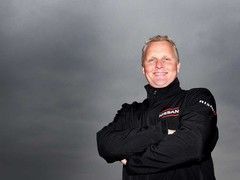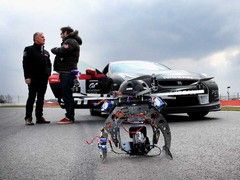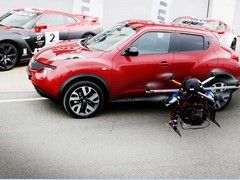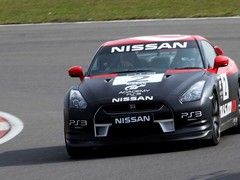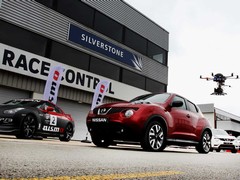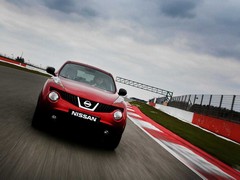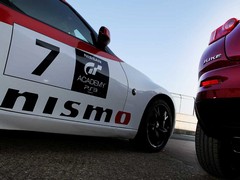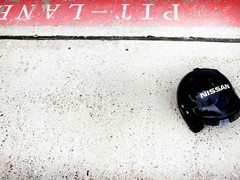Nissan pioneers drone training
Fry-ups banned as firm plots mobile laboratory to ensure GT Academy stars are in peak fitness
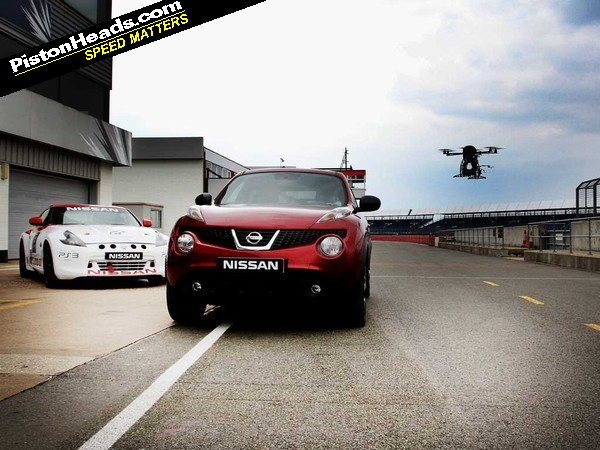
These days, Herbert tells us, drivers bypass the crispy bacon to run round the track ahead of the race as part of a frenetic training schedule. Ever busy, the ex-Benetton star has been taken on by Nissan to make training even tougher for its GT Academy and Le Mans drivers. Together they've come up with a wheeze to digitally analyse every last action by the drivers to improve their race performance including, possibly, whether they've snuck in a fried slice that morning.
The plan is to turn an ordinary Juke into a sort of driveable pit box with enough computer power to run a bank of computer screens out of the boot that'll display information ranging from the usual telematics data to biometric details. "It gives all the information the driver needs without being in the pit box, which is pretty crowded anyway," says Herbert.
In this way, the GT Academy drivers will be whipped up into a state of competitive anguish by comparing not just lap times, but how chilled out they are based on heart rates in certain corners. Not just on training laps but also at endurance races such as Le Mans, where this year former gamers Lucas Ordonez and Jann Mardenborough will race a Greaves-entered LMP2 car.
The Juke will also get a very fashionable drone helicopter, which records and relays video of each driver's line round specific corners and can be landed on the roof. Nissan wants to throw even more gadgetry into this car, with Herbert mentioning displays to show drivers' brainwaves and even breath rates. "Into a fast corner, most people hold their breath," he tells us.
Fair enough. Nothing fires up drivers more than competition, even it is just that you've got better breath control than the other guy. We're increasingly seeing this competitive fitness in motorsport. For example at Porsche's Human Performance centre in Silverstone, where the likes of Mark Webber have trained, drivers are encourage to take the Grid Fit Challenge, dubbed the "ultimate physical test of a motorsport athlete".
This is basically a timed circuit, starting with a mile run and including press-ups, tyre-lifts and rowing. And yup, there's a leader board. Champion as of last year with a time of 17min 49sec was Brit Moto GP rider Bradley Smith.
The challenge includes two sessions on the wall-mounted Batak reaction testing machine on which drivers hit pads as they light up. One session comes right at the end, to see whether all that running and jumping has slowed your reactions any. On the makers's website there's a video of Jenson Button getting all competitive with his engineer.
Herbert reckons the fitness training is as much about the mind as the body. "When you're fit you put yourself in a much more positive mood" he says. "At Le Mans sometimes you're in the car for four hours. Your mental capacity has got to be able to absorb everything that's going on."
In a bid to get general punters more switched onto its motorsport activities, Nissan is asking for ideas on other gadgetry to fit to this Juke that'll help its GT Academy drivers become faster on the track. We're guessing our waffle iron suggestion won't make the cut...

Sounds like a top idea, though. I'm surprised biometrics aren't used - presumably not permitted - in Formula 1. While I imagine it's a lot easier to go about installing this stuff in a tin top, Nissan obviously have it figured for open cars if they plan to use it in LMP2.
I do love GT Academy. Proof that racing talent is racing talent, no matter what medium you're racing in - these boys had never sat in a real race car a couple of years ago, and now they're not allowed in British GT as amateur drivers, their pace forcing the organisers to make an exception and class them as professionals!
I'm not saying a fry up is the best breakfast for a racing driver, because their physical needs are different to, say, a rugby player. However, it is wrong to automatically label all fry-ups as bad for everyone, when, depending on the circumstances, they aren't.
I'm not saying a fry up is the best breakfast for a racing driver, because their physical needs are different to, say, a rugby player. However, it is wrong to automatically label all fry-ups as bad for everyone, when, depending on the circumstances, they aren't.
I'm not saying some of the skills like hand eye co-ordination aren't transferable but driving a car in a game vs real life requires some very different skill sets and I don't think it's as transferable as the Sony\Nissan PR machine would like you to believe. I'd put it more down to the fact that if you put 50 young people in a racing car, the law of averages dictates that at least one of them is likely to show a modicum of talent which can be built on, whether they've spent 100 hours playing GT5 or not.
I'm not saying a fry up is the best breakfast for a racing driver, because their physical needs are different to, say, a rugby player. However, it is wrong to automatically label all fry-ups as bad for everyone, when, depending on the circumstances, they aren't.
Anyway, in relation to the real subject of the article, I think personal performance (i.e. fitness, general health, mental state) and being able to analyse it is very important. They already do it in other sports, so why not motor racing.
I'm not saying a fry up is the best breakfast for a racing driver, because their physical needs are different to, say, a rugby player. However, it is wrong to automatically label all fry-ups as bad for everyone, when, depending on the circumstances, they aren't.
Re: the article, fantastic stuff. Long live GT academy - how long before one of them is mooted to be having a stab at F1 I wonder...

- Searches Youtube for Tim Harvey quotes from earlier in the season...*


- Searches Youtube for Tim Harvey quotes from earlier in the season...*


Anyway, moving job soon so hoping I'll actually have more time to lose weight. Big Bones mean I'll still end up being the heaviest driver on the grid, but at least I wont be twice as heavy as Frank Wrathall.
Or perhaps the easier route would be to get my mum to start baking him cakes...
I did meet Tim Harvey at the Birmingham motorshow when I was younger though, and grew up with a signed photo of his green and gold Peugeot 406 on my wall.
I did meet Tim Harvey at the Birmingham motorshow when I was younger though, and grew up with a signed photo of his green and gold Peugeot 406 on my wall.
Having said that, it is pretty frustrating when you're 20-30kg down on your team mate and you can see the time ebbing away on the data.
Unfortunately I am just a big bloke rather than being completely fat (powerfully built?), and having a day job and social life limits enthusiasm for epic workout regimes.
I'm not saying some of the skills like hand eye co-ordination aren't transferable but driving a car in a game vs real life requires some very different skill sets and I don't think it's as transferable as the Sony\Nissan PR machine would like you to believe. I'd put it more down to the fact that if you put 50 young people in a racing car, the law of averages dictates that at least one of them is likely to show a modicum of talent which can be built on, whether they've spent 100 hours playing GT5 or not.
Of course there are plenty who can't deal with the forces, who take daft risks, who don't have natural talent so much as a truly excessive amount of time spent practicing for each Academy challenge, those who are nowhere near fit enough.. But if you took someone who could drive, was in good shape and showed proper talent in a simulator, then yes I do believe they would be very quick in reality too.
Bear in mind that these guys are looking extremely fast next to some seriously talented and experienced drivers. It's not like finding a modicum of talent and just nurturing it from an early age, plenty of racers have that, but did you know the outright fastest lap in the Silverstone Blancpain race last weekend was set by Lucas? None of the Pro-class cars could match that, including Darren Turner's works Aston. The process really has found prodigiously quick drivers.
When it comes to racing, I've been told that seat time is about the most valuable thing you can get. The GT Academy drivers have gone though an intensive progamme of training with more experts and kit than an F1 team (well not quite but you see my point). Also, it's all they do, no jobs, no other commitments, just racing. Very very very few people get to do this, even professional racers. Very few people are actually paid to race, most pay to race, even up in BTCC and F1.
The GT Academy boys are a lucky bunch!
...The GT Academy boys are a lucky bunch!
However, you can't teach a dog to play the violin. They might have found their potential quickly through intensive training, but it was there to be found.
Gassing Station | General Gassing | Top of Page | What's New | My Stuff

